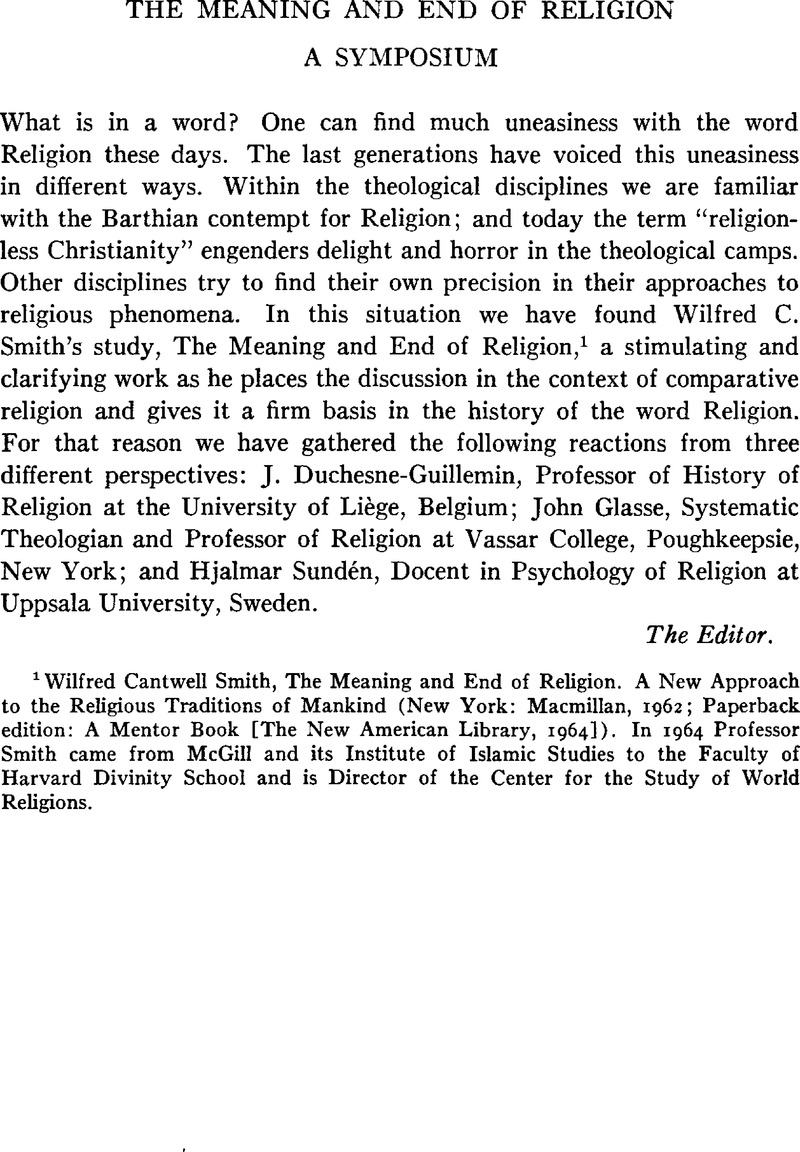No CrossRef data available.
Article contents
The Meaning and End of Religion: A Symposium
Published online by Cambridge University Press: 23 August 2011
Abstract

- Type
- Notes and Observations
- Information
- Copyright
- Copyright © President and Fellows of Harvard College 1965
References
page 432 note 1 Wilfred Cantwell Smith, The Meaning and End of Religion. A New Approach to the Religious Traditions of Mankind (New York: Macmillan, 1962; Paperback edition: A Mentor Book [The New American Library, 1964]). In 1964 Professor Smith came from McGill and its Institute of Islamic Studies to the Faculty of Harvard Divinity School and is Director of the Center for the Study of World Religions.
page 439 note 1 Since reflection from within a tradition is what is most pertinent, I shall feel free to confine test cases to my own Protestant strand of Christian tradition. The limitations that result hardly need to be specified.
page 439 note 2 Incidentally, the height of his hopes for understanding the faith of men in other traditions suggests that, among those precedents, he has affinities with a more universalistic stance toward religious particularity, which found expression in Logos theology, scholastic philosophical theology, and natural religion. At any rate, these hopes of his show that his appropriation of historical relativity is less radical than that made by Troeltsch and his successors. For recent reflection upon issues posed by the latter, see Gordon D. Kaufman, Relativism, Knowledge and Faith (Chicago: The University of Chicago Press, 1960).
page 444 note 3 Austin Farrer, Finite and Infinite. A Philosophical Essay (Westminster [London]: Dacre Press, 1943; 2nd ed., London: A. & C. Black, 1959), ch. XXI.
page 445 note 1 Cf. Delacroix, Henri, “Une école de psychologie religieuse,” Revue germanique 1(1905), 226ffGoogle Scholar.
page 445 note 2 Cf. J. H. Van Den Berg, Psychologie en geloof (Nijkerk, 1958).
page 445 note 3 Cf. F. H. Allport, Theories of Perception and the Concept of Structure (Wiley, 1955).
page 447 note 4 The best orientation about the notion of ‘role’ in psychology is given by Dr. Anne-Marie Rocheblave-Spenlé in La notion de rôle en psychologie sociale (Paris, 1962). For a first introduction see Theodore R. Sarbin, “Role Theory,” Ch. 6 in Handbook of Social Psychology, Vol. I, ed. by Gardner Lindzey (1954). I have tried to introduce this notion into the psychology of religion in my book Religionen och Rollerna (Stockholm, 1959). A German translation will appear before the end of 1965 (Alfred Töpelmann Verlagsbuchhandlung, Berlin). Cf. also Sundén, Hj., “Die Religion und die Rollen,” Archiv für Religionspsychologie 7(1962), 277–81Google Scholar, and “Die Rollenpsychologie als heutige Aufgabe der Religionspsychologie,” ibid. 8(1964), 70–81.
page 449 note 5 M. Dauthendey, Gesammelte Werke II. Letzte Reise. Aus Tagebüchern, Briefen und Aufzeichnungen (München, 1925), 526.
page 449 note 6 Cf. Georg Siegmund, Psychologie des Gottesglaubens auf Grund literarischer Selbstzeugnisse (Münster i/W, 1937).
page 449 note 7 [In the traditional edition of the Luther Bible this verse (as are verses 14 and 23) is printed in bold-face, thus giving it special emphasis.— Ed.'s note.]
page 451 note 8 Many psychological findings indicate that we must reckon with two different kinds of people, the one being able to see roles and assimilate them, the other without this disposition. The latter prefers the doctrines of religious traditions so that we can speak of the role-man (goal-oriented) versus the doctrine-man (threatoriented). I think Smith's protest against reifying religion to an intellectual entity and his preference for the cumulative tradition is an important reaction to the dominance of doctrine-men.
page 451 note 9 I think we can keep the word ‘religion’ as denoting man's relation to the Totality. It is to the All that man directs his requests for guidance through oracles and omnia. In the long run of the cumulative tradition the Totality has revealed itself not only as ‘will’ but also as ‘cosmic order’. Patterns concerned with cosmic order also deserve our attention.




